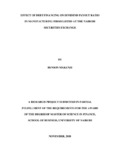| dc.contributor.author | Makenzi, Benson | |
| dc.date.accessioned | 2019-01-14T13:22:31Z | |
| dc.date.available | 2019-01-14T13:22:31Z | |
| dc.date.issued | 2018 | |
| dc.identifier.uri | http://hdl.handle.net/11295/104638 | |
| dc.description.abstract | Dividend payment is a contentious issue in finance. Dividend payment is such an important issue in every organization that management has to take it into consideration in order to satisfy their shareholders. Various theories have come up trying to identify the determinants of dividend payout, more so the influence of debt financing on dividend payout ratio. Notwithstanding the numerous theories and models developed to clarify the relationship between these two variables, the relationship remains a puzzle. The aim of this study was to determine the effect of debt financing on dividend payout ratio of manufacturing and allied firms quoted at the NSE. The population for the study was all the 9 manufacturing and allied companies quoted at the NSE. The independent variables for the study were debt financing as measured by debt ratio, firm size as measured by natural logarithm of total assets, profitability as measured by return on equity and liquidity as measured by current ratio while dividend payout ratio of manufacturing and allied companies listed at the NSE as measured by the ratio of dividend per share to earnings per share on an annual basis was the dependent variable. Secondary data was collected over a five 5 year time frame (January 2013 to December 2017) annually. The descriptive cross-sectional research design was employed for the study and the relationship between variables established using multiple linear regression analysis. Data analysis was undertaken using the SPSS software. The results of the study produced R-square value of 0.235 which means that about 23.5 percent of the variation in dividend payout ratio of manufacturing and allied firms quoted at the NSE can be explained by the four selected independent variables while 76.5 percent in the variation of dividend payout ratio of manufacturing and allied firms listed at the NSE was associated with other factors not covered in this research. The study also found that the independent variables had a weak correlation with dividend payout ratio of manufacturing and allied firms listed at the NSE (R=0.485). ANOVA results show that the F statistic was significant at 5% level with a p=0.027. Therefore the model was fit to explain the association between the selected variables. The findings also showed that profitability produced positive and statistically significant values for this study. Debt financing produced negative but statistically insignificant values while liquidity and firm size were also found to be a statistically insignificant determinants of dividend payout ratio among manufacturing and allied firms’ quoted at the NSE. This study recommends adequate measures should be put in place by managers of these firms to improve and grow their dividend payout ratio by increasing their profitability. | en_US |
| dc.language.iso | en | en_US |
| dc.publisher | University of Nairobi | en_US |
| dc.rights | Attribution-NonCommercial-NoDerivs 3.0 United States | * |
| dc.rights.uri | http://creativecommons.org/licenses/by-nc-nd/3.0/us/ | * |
| dc.subject | Effect of Debt Financing on Dividend Payout Ratio in Manufacturing Firms Listed at the Nairobi Securities Exchange | en_US |
| dc.title | Effect of Debt Financing on Dividend Payout Ratio in Manufacturing Firms Listed at the Nairobi Securities Exchange | en_US |
| dc.type | Thesis | en_US |



